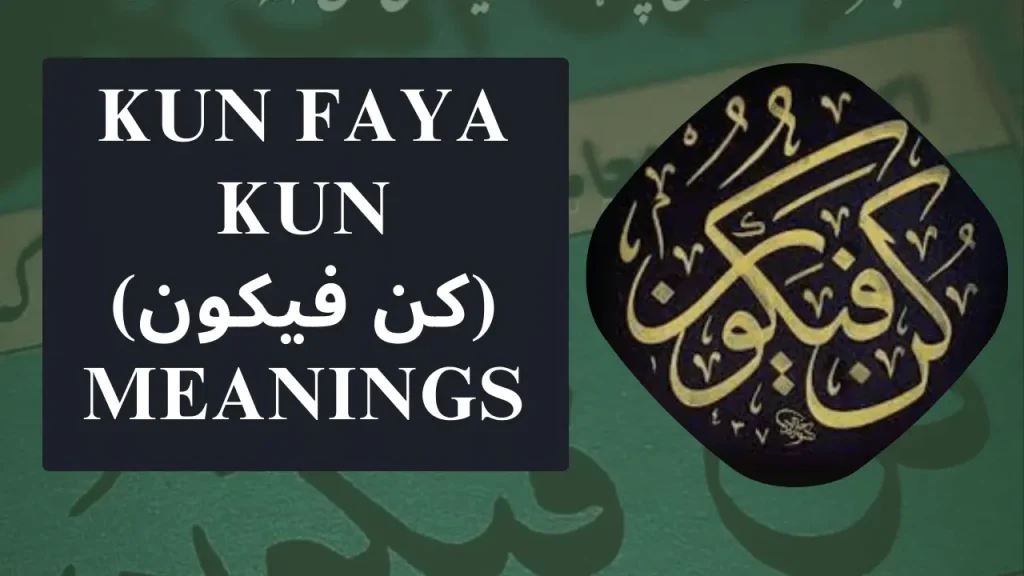Discover the multifaceted interpretation of ‘Kun Faya Kun’ (كن فيكون) in Hindi and various other languages in this enlightening exploration.”
The meaning of “Kun Faya Kun” is often linked with divine order or the idea of creation through speech in Islamic religion. The sentence is not merely a set of words but a profound spiritual idea that explores the connection between the Creator and the world.
This exciting term has many meanings, varying from religious to intellectual. It’s a topic that has been widely studied, dissected, and discussed among professors, philosophers, and spiritual leaders. This thorough piece will uncover the various parts of “Kun Faya Kun,” its beginnings, its importance in current speech, and its effect on diverse artistic forms.
Prepare to start on a trip into the depths of a term that defines the core of life itself.

Kun Faya Kun Meaning In Islam
Kun (كن) is an Arabic word for the action of “manifesting,” “existing,” or “being” and consisting of the letters Kaph and Nun (letter). Allah Almighty repeatedly eight times orders “To Be, and that completed“(كُن فَيَكُونُ) in the Quran. Kun Faikun is describing the creation power of Allah Almighty, that the work that Allah Almighty has recognized to be done or to bring a living being into existence only says “Kun” for it, and it becomes “Fayakun.”
Kun Faya Kun Meaning In Quran
In the Quran, (كن فيكون) repeated eight times. Out of the eight aya, the word “KUN FAYA KUN” has been used at the end of aya in seven aya, while in one ayat (Sura Al-In’aam, Surah # 6, Ayat NO# 73), it is used in almost the middle of the aya. Following are Ayahs in which KUN FAYA KUN mentioned;
1.(Quran Majeed, Sura Aal-i-Imran, Sura # 3, Ayat # 47-48)

Maryam was astonished, “My Lord! How can I birth a child when no man has ever touched me?” An angel answered, “So will it be. Allah makes what He wills. When He declares a thing, He tells it, ‘Be!’ And it is!
2.(Quran Majeed, Sura Aal-i-Imran, Sura # 3, Aya # 59-60)

Indeed, the specimen of Jesus in the sight of Allah is like that of Adam. He originated him from dust, then said to him, “Be!” And he was!
3.(Quran Majeed, Sura Maryam, Sura # 19, Aya # 35)

It is not for Allah to take a child! Glory be to Him. When He commands a matter, He tells it, “Be!” And it is!
4.(Quran Majeed, Sura Al-Baqara, Sura # 2, Aya 118)

He is the inventor of the heavens and the earth! When He orders a matter, He tells it, “Be!” And it is!
5.(Quran Majeed, Sura Al-An’aam, Sura # 6, Aya # 72-73)

He is the One Who made the heavens and earth in truth. On the Day of Doomsday˺ He will say, ‘Be!‘ And there will be! His order is truth. All authority is His ˹alone˺1 on the Day the Proclaim will be blown.2 He is the Knower of all—seen or hidden. And He is the All-Wise, All-Aware.
6.(Quran Majeed, Sura Yaseen, Sura # 36, Aya # 82)

When He intents something to exist, He says “Be!” and it is created.
7.(Quran Majeed, Sura An-Nahl, Sura # 16, Aya # 40)

When He intents something to exist, He says “Be!” and it is created.
8.(Quran Majeed, Sura Ghaafir, Sura # 40, Aya # 68)

He is the One Who awards life and causes death. When He orders a matter, He says it, “Be!” And it is!
Kun Faya Kun Means In Quran In Urdu.
قرآن میں (كن فيكون) آٹھ بار دہرایا گیا ہے۔ آٹھ آیات میں سے سات آیات میں آیت کے آخر میں “کن فیکون” کا جملہ استعمال ہوا ہے جبکہ ایک آیت میں (سورۃ الانعام، سورہ نمبر 6، آیت نمبر 73) تقریباً درمیان میں استعمال ہوا ہے۔ درج ذیل آیات ہیں جن میں کن فیکون کا ذکر کیا گیا ہے

مریم نے تعجب سے کہا، “میرے رب! جب مجھے کسی مرد نے ہاتھ تک نہیں لگایا تو میرے بچے کیسے ہوں گے؟ ایک فرشتے نے جواب دیا، “ایسا ہی ہوگا۔ اللہ جو چاہتا ہے پیدا کرتا ہے۔ جب وہ کسی معاملے کا فیصلہ کرتا ہے، تو وہ اسے صرف کہتا ہے، ‘ہو جا!’ اور یہ ہو جاتا ہے! (قرآن مجید، سورہ آل عمران، سورہ نمبر 3، آیت نمبر 47)

بے شک اللہ کے نزدیک عیسیٰ کی مثال آدم کی سی ہے۔ اس کو مٹی سے پیدا کیا، پھر اس سے کہا کہ ہو جا! اور وہ تھا! (قرآن مجید، سورہ آل عمران، سورہ نمبر 3، آیت نمبر 59)

بیٹا پیدا کرنا اللہ کے بس کی بات نہیں! وہ پاک ہے۔ جب وہ کسی معاملے کا فیصلہ کرتا ہے تو وہ اسے صرف یہ کہتا ہے کہ ہو جا! اور یہ ہے! (قرآن مجید، سورہ مریم، سورہ نمبر 19، آیت نمبر 35)

وہ آسمانوں اور زمین کو بنانے والا ہے! جب وہ کسی معاملے کا فیصلہ کرتا ہے تو وہ اسے صرف یہ کہتا ہے کہ ہو جا! اور یہ ہے! (قرآن مجید، سورہ البقرہ، سورہ نمبر 2، آیت 118)

وہی ہے جس نے آسمانوں اور زمین کو حق کے ساتھ پیدا کیا۔ قیامت کے دن وہ کہے گا کہ ہو جا، اور ہو گا۔ اس کا حکم حق ہے۔ تمام اختیار اسی کا ہے جس دن صور پھونکا جائے گا۔ 2 وہ سب دیکھے یا غیب کا جاننے والا ہے۔ اور وہ حکمت والا اور باخبر ہے( قرآن مجید، سورہ الانعام، سورہ نمبر 6، آیت نمبر (73)

جب وہ کسی چیز کو بننا چاہتا ہے تو بس اس سے صرف یہ کہنا ہے کہ ’’ہوجا‘‘۔ اور یہ ہے!(قرآن مجید، سورہ یٰسین، سورہ نمبر 36، آیت نمبر 82)

اگر ہم کبھی کسی چیز کو وجود میں لانا چاہتے ہیں، تو ہم صرف یہ کہتے ہیں: “ہو جا!” اور یہ ہے! (قرآن مجید، سورہ النحل، سورہ نمبر 16، آیت نمبر 40)

وہی زندگی دیتا ہے اور موت دیتا ہے۔ جب وہ کسی معاملے کا فیصلہ کرتا ہے تو وہ اسے صرف یہ کہتا ہے کہ ہو جا! اور یہ ہے! (قرآن مجید، سورہ غافر، سورہ نمبر 40، آیت نمبر 68)
ALL LANGUAGES
Kun Faya Kun Meaning In Urdu
کن ایک عربی لفظ ہے جو “ظاہر“، “موجودہ” یا “ہونے” کے عمل کے لیے ہے اور اس میں حروف کاف اور نون (خط) شامل ہیں۔ اللہ تعالی قرآن مجید میں بار بار آٹھ بار حکم دیتا ہے کہ “ہو جائے اور وہ مکمل ہو جائے” (كُن فَيَكُونُ)۔ کن فیکون اللہ رب العزت کی تخلیقی قوت کو بیان کر رہا ہے کہ اللہ تعالیٰ نے جس کام کو کرنا یا کسی جاندار کو وجود میں لانا تسلیم کیا ہے اس کے لیے صرف “کن” کہتے ہیں اور وہ “فَيَكُونُ“ہو جاتا ہے۔
Kun Faya Kun Meaning In English
Kun fa-yakūnu is referenced in the Quran as a symbol or sign of God’s supreme creative power. Kun (كن) is an Arabic word for the action of “manifesting,” or “existing,” and consisting of the letters Kaph and Nun (letter).
In the Qur’an, the word (كن فيكون) came several times in which Allah orders the universe to “be” (“kun!” كن!) so that it is (fa-yakūnu فيكون). Kun Faikun is describing the creation power of Allah Almighty, that the work that Allah Almighty has recognized to be done or to bring a living being into existence only says “Kun” for it, and it becomes “Fayakun.”
Kun Faya Kun Meaning In Arabic
(كن) كلمة عربية تدل على فعل “الظهور” أو “الموجود” أو “الموجود” وتتكون من حرفي الكاف والنون. في القرآن تكررت كلمة ( فيكون) عدة مرات حيث أمر الله الكون أن يكون ( كن!)» فيكون ( فيكون). “كن فيكون” هو وصف قدرة الله تعالى على الخلق، وأن العمل الذي أقر الله تعالى القيام به أو خلق كائن حي لا يقول له إلا “قرابة” فيصبح “فيكون
Kun Faya Kun Meaning In Hindi
कुन (كن) “प्रकट होना,” “मौजूदा,” या “होना” की क्रिया के लिए एक अरबी शब्द है और इसमें कफ और नून (अक्षर) अक्षर शामिल हैं। कुरान में, शब्द (كن فيكون) कई बार दोहराया गया है जिसमें अल्लाह ब्रह्मांड को “होने” (“कुन!” كن!) का आदेश देता है ताकि यह (फा-याकुनु فيكون) हो। कुन फैकुन अल्लाह सर्वशक्तिमान की सृजन शक्ति का वर्णन कर रहा है, कि अल्लाह सर्वशक्तिमान ने जिस कार्य को करने या किसी जीवित प्राणी को अस्तित्व में लाने के लिए मान्यता दी है, उसके लिए केवल “किन” कहता है, और वह “फयाकुन” बन जाता है।
Kun Faya Kun, meaning in Sindhi

Kun Faya Kun Meaning In Bengali
কুন (كن) একটি আরবি শব্দ যা “প্রকাশ করা,” “বিদ্যমান” বা “সত্তা” এবং কাফ এবং নুন (অক্ষর) অক্ষর নিয়ে গঠিত। আল্লাহ সর্বশক্তিমান বারবার কুরআনে “হতে হবে এবং তা সম্পূর্ণ” (كُن فَيَكُونُ) আটবার আদেশ দিয়েছেন। কুন ফাইকুন আল্লাহ রাব্বুল আলামিনের সৃষ্টি শক্তির বর্ণনা দিচ্ছেন যে, আল্লাহ রাব্বুল আলামিন যে কাজ করতে বা জীবকে অস্তিত্বে আনার স্বীকৃতি দিয়েছেন তার জন্য শুধু “কুন” বলে, আর তা হয়ে যায় “ফায়াকুন।”
Kun Faya Kun Meaning In Malayalam
കുൻ (كن) എന്നത് “പ്രകടമാക്കൽ,” “നിലവിലുള്ളത്,” അല്ലെങ്കിൽ “ആയിരിക്കുന്നത്” എന്നിവയുടെ പ്രവർത്തനത്തിനുള്ള ഒരു അറബി പദമാണ്, കൂടാതെ കഫ്, നൻ (അക്ഷരം) എന്നീ അക്ഷരങ്ങൾ അടങ്ങിയിരിക്കുന്നു.
സർവശക്തനായ അല്ലാഹു ഖുർആനിൽ “ആയിരിക്കുക, അത് പൂർത്തിയാക്കുക” (كُن فَيَكُونُ) എന്ന് എട്ട് തവണ ആവർത്തിച്ച് കൽപ്പിക്കുന്നു. സർവ്വശക്തനായ അല്ലാഹുവിന്റെ സൃഷ്ടിശക്തിയെ കുൻ ഫൈകുൻ വിവരിക്കുന്നു, സർവ്വശക്തനായ അല്ലാഹു അംഗീകരിച്ച പ്രവൃത്തി അല്ലെങ്കിൽ ഒരു ജീവിയെ അസ്തിത്വത്തിലേക്ക് കൊണ്ടുവരാൻ “കുൻ” എന്ന് മാത്രമേ പറയൂ, അത് “ഫയാകുൻ” ആയിത്തീരുന്നു.
Conclusion
In summing up the diverse world of “Kun Faya Kun,” it’s clear that this old Arabic phrase has a profound and lasting effect, echoing not only within the areas of religion and spirituality but also stretching to art, literature, and scholarly debate.
With meanings ranging from divine order to philosophical philosophy, “Kun Faya Kun” is a fascinating lens through which one can study complicated concepts of creation, existence, and the holy will. The phrase’s lasting relevance is a testament to its global appeal and capacity to inspire deep reflection and academic inquiry.
